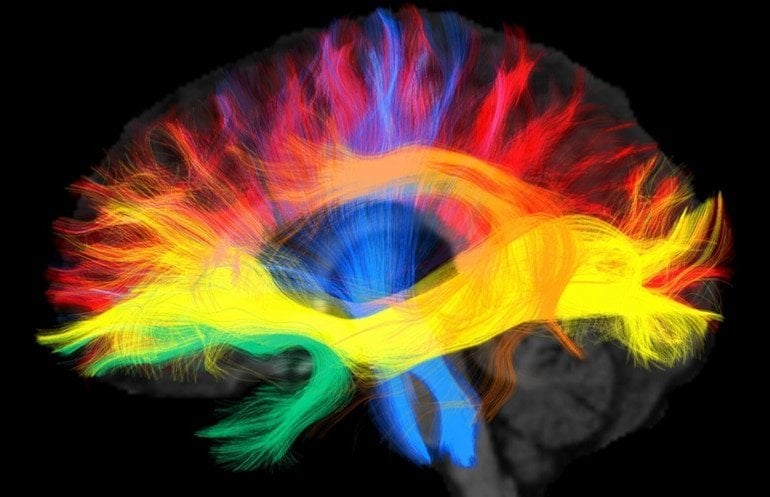Summary: Our native language may affect the way in which our brains are wired and underlie the way we think, a new study reports. Using neuroimaging to analyze neural connectivity in native German and native Arabic speakers, researchers found stronger connectivity between the right and left hemispheres in Arabic speakers, and stronger connectivity in the left hemisphere language area in German speakers.
Source: Max Planck Institute
Scientists at the Max Planck Institute for Human Cognitive and Brain Sciences in Leipzig have found evidence that the language we speak shapes the connectivity in our brains that may underlie the way we think.
With the help of magnetic resonance tomography, they looked deep into the brains of native German and Arabic speakers and discovered differences in the wiring of the language regions in the brain.
Xuehu Wei, who is a doctoral student in the research team around Alfred Anwander and Angela Friederici, compared the brain scans of 94 native speakers of two very different languages and showed that the language we grow up with modulates the wiring in the brain. Two groups of native speakers of German and Arabic respectively were scanned in a magnetic resonance imaging (MRI) machine.
The high-resolution images not only show the anatomy of the brain, but also allow to derive the connectivity between the brain areas using a technique called diffusion-weighted imaging. The data showed that the axonal white matter connections of the language network adapt to the processing demands and difficulties of the mother tongue.

“Arabic native speakers showed a stronger connectivity between the left and right hemispheres than German native speakers,” explained Alfred Anwander, last author of the study that was recently published in the journal NeuroImage. “This strengthening was also found between semantic language regions and may be related to the relatively complex semantic and phonological processing in Arabic.”
As the researchers discovered, native German speakers showed stronger connectivity in the left hemisphere language network. They argue that their findings may be related to the complex syntactic processing of German, which is due to the free word order and greater dependency distance of sentence elements.
“Brain connectivity is modulated by learning and the environment during childhood, which influences processing and cognitive reasoning in the adult brain. Our study provides new insights how the brain adapts to cognitive demands, that is, the structural language connectome is shaped by the mother tongue,” said Anwander.
This is one of the first studies to document differences between the brains of people who grew up with different native languages and could give researchers a way to understand cross-cultural processing differences in the brain. In a next study, the research team will analyze longitudinal structural changes in the brains of Arabic-speaking adults as they learn German over six months.
About this neuroscience research news
Author: Press Office
Source: Max Planck Institute
Contact: Press Office – Max Plank Institute
Image: The image is credited to MPI CBS
Original Research: Open access.
“Native language differences in the structural connectome of the human brain” by Xuehu Wei et al. NeuroImage
Abstract
Native language differences in the structural connectome of the human brain
Is the neuroanatomy of the language structural connectome modulated by the life-long experience of speaking a specific language?
The current study compared the brain white matter connections of the language and speech production network in a large cohort of 94 native speakers of two very different languages: an Indo-European morphosyntactically complex language (German) and a Semitic root-based language (Arabic). Using high-resolution diffusion-weighted MRI and tractography-based network statistics of the language connectome, we demonstrated that German native speakers exhibited stronger connectivity in an intra-hemispheric frontal to parietal/temporal dorsal language network, known to be associated with complex syntax processing.
In comparison, Arabic native speakers showed stronger connectivity in the connections between semantic language regions, including the left temporo-parietal network, and stronger inter-hemispheric connections via the posterior corpus callosum connecting bilateral superior temporal and inferior parietal regions.
The current study suggests that the structural language connectome develops and is modulated by environmental factors such as the characteristic processing demands of the native language.







